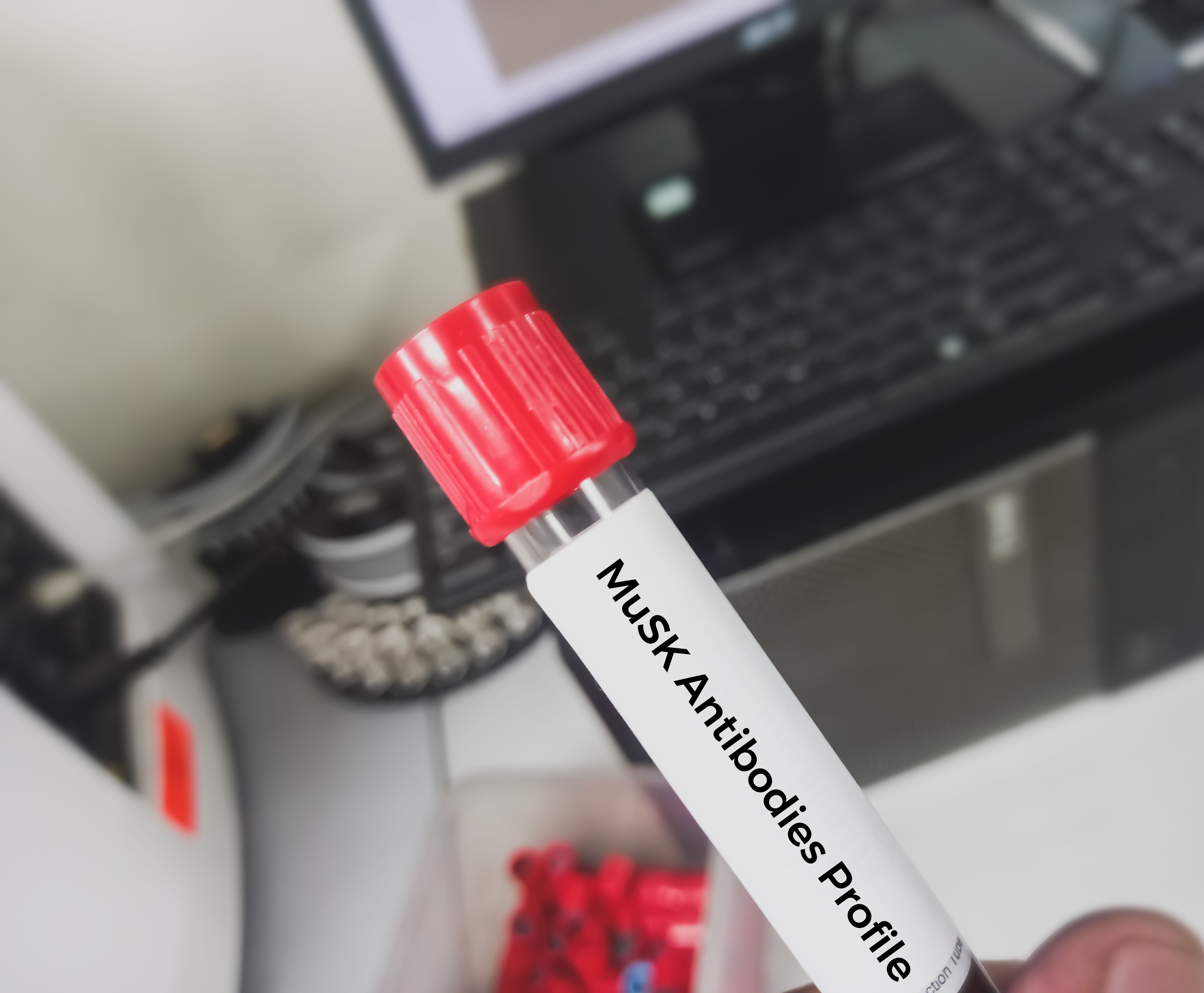- Center on Health Equity & Access
- Clinical
- Health Care Cost
- Health Care Delivery
- Insurance
- Policy
- Technology
- Value-Based Care
Rozanolixizumab Effective in Patients With MuSK MG, Analysis Shows
A new subgroup analysis of patients with muscle-specific tyrosine kinase (MuSK) autoantibody-positive (Ab+) myasthenia gravis (MG) shows rozanolixizumab (Rystiggo) contributes to meaningful symptom improvement.
The monoclonal antibody rozanolixizumab (Rystiggo) is an effective therapy for patients with the muscle-specific tyrosine kinase (MuSK) autoantibody-positive (Ab+) subtype of generalized myasthenia gravis (gMG), a new report shows.
The findings, which were published in Therapeutic Advances in Neurological Disorders, were based on a subgroup analysis of the phase 3 MycarinG study.1
MuSK Antibody profile vial | image credit: MdBabul - stock.adobe.com

The large majority of people with MG have autoantibodies against the acetylcholine receptor (AChR), but an estimated 5-8% of people with MG have MuSK autoantibodies.2 Patients in the MuSK subgroup are more likely to be female and to have an early onset disease, explained corresponding author Ali A. Habib, MD, of the University of California Irvine, and colleagues.
They said MuSKgMG also tends to be more severe than AChR-associated MG (AChR-MG).
“Due to the atypical onset and clinical features of the disease, including marked muscle atrophy, selective bulbar involvement and lack of symptom fluctuations, the diagnosis of MuSK Ab+ gMG can be challenging,” they wrote.
MuSK Ab+ gMG is mainly mediated by immunoglobulin G4 (IgG4), the authors said. Rozanolixizumab is a humanized IgG4 antibody that binds to the neonatal Fc receptor (FcRn) thereby reducing IgG autoantibodies, including IgG4 autoantibodies, the investigators said.
In 2023, the therapy was approved by the FDA to treat adult patients with AChR Ab+ gMG or MuSK Ab+ gMG based on results from the MycarinG trial.3
Despite the approval, Habib and colleagues noted that therapies for AChRgMG do not always work for patients with MuSKgMG. Thus, they launched a subgroup analysis of the MycarinG study to clarify the therapy’s effect on patients with the rarer subtype.1
Of the 200 patients included in the original trial, 21 had MuSKgMG. Those 21 patients were split among 3 trial arms; 5 patients received rozanolixizumab at a dosage of 7 mg/kg; 8 patients received the therapy at a 10 mg/kg dosage; and 8 patients received a placebo. The primary endpoint was change from baseline to Day 43 in scores on the MG Activities of Daily Living (MG-ADL) assessment.
When Habib and colleagues analyzed the experiences of the 21 MuSKgMG patients, they found that the least squares mean (LSM) change for patients in the 7 mg/kg group was -7.28 (standard error: 1.94); 10 mg/kg, -4.16 (1.78); and placebo, 2.28 (1.95). Compared to placebo, patients in the 7 mg/kg had an LSM difference of -9.56 (97.5% CI, -15.25 to -3.87) and those in the 10 mg/kg had a difference from placebo of -6.45 (97.5% CI, -11.03 to -1.86).
The investigators said it was notable that patients taking the 7 mg/kg dose appeared to have greater numerical improvement than those in the higher-dosage group, which was the inverse of what happened in the overall population of the MycarinG study. The authors say that may be because patients with MuSKgMG in the 7 m/kg subgroup had more severe symptoms at baseline than those in the 10 mg/kg group, thus creating more room for improvement.
“However, due to the small number of patients with MuSK Ab+ gMG in each dosing group, the apparent larger effect of the lower dose in MuSK patients may simply be due to chance,” they wrote.
Ali and colleagues added that pharmacodynamic data showed that IgG4 was lowered in line with total IgG, further suggesting that rozanolixizumab was effective.
In terms of safety, 12 participants, including 3 in the placebo group, experienced treatment-emergent adverse events, the most frequent of which were headache, diarrhea, and nausea.
The investigators said the data suggest rozanolixizumab is effective and well-tolerated.
“Together, these data support the use of rozanolixizumab as a treatment for patients with MuSK Ab+ gMG,” they conclude.
References:
- Habib AA, Sacconi S, Antonini G, et al. Efficacy and safety of rozanolixizumab in patients with muscle-specific tyrosine kinase autoantibody-positive generalised myasthenia gravis: a subgroup analysis of the randomised, double-blind, placebo-controlled, adaptive phase III MycarinG study. Ther Adv Neurol Disord. 2024;17. doi:10.1177/17562864241273036
- Rodolico C, Bonanno C, Toscano A, Vita G. MuSK-associated myasthenia gravis: clinical features and management. Front Neurol. 2020;11:660. Published 2020 Jul 23. doi:10.3389/fneur.2020.00660
- Bril V, Drużdż A, Grosskreutz J, et al. Safety and efficacy of rozanolixizumab in patients with generalised myasthenia gravis (MycarinG): a randomised, double-blind, placebo-controlled, adaptive phase 3 study. Lancet Neurol. 2023;22(5):383-394. doi:10.1016/S1474-4422(23)00077-7
